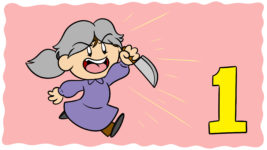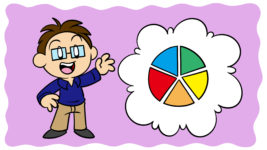Everybody loves a good love triangle… as long as they’re not part of it. It’s a sad fact of human nature: other people’s drama makes us feel better about our own lives. Not only that, when things are complicated, they need to be resolved. There’s nothing a reader loves more than conflict and resolution, even if the ‘resolution’ comes in the form of shock, death, infidelity – all manner of ‘bad’ endings can still be satisfying if the conflict has been set up right.
The love triangle provides the perfect frame for conflict and resolution. Done right, a love triangle can mean double success: readers enjoy the complexity, the ‘oh my gosh, I can’t believe they did that’ factor, and the deep sigh of satisfaction when everything’s finally resolved.
Done wrong, a love triangle feels cheesy or cliché and can make readers run faster than another ‘dark and stormy night’.
Even so, love triangles are timeless features of many stories. Even the less likely genres – action, horror, and children’s lit – include them. They can be a main feature or an enriching subplot; adding tenderness or agony, joy or heartache, purpose or distraction to any narrative. Of course, that doesn’t mean they’re easy to write, which is exactly why we’re here…
Conflict
Conflict is the vital ingredient for storytelling. Few stories can manage to be interesting without it. Relationships are flat without it. Love triangles are 100% boring without it. However you configure your love triangle, there should be some struggle, discomfort, inner strife, and maybe a duel or two.
You may write a classic triangle in which two parties vie for the heart of the third, in which case conflict is inherent. Or the two adjacent parties may be completely unaware of each other, and the fulcrum character struggles to make a choice. If you’re writing a modern moral exposé in which the polyamorous throuple is perfectly content to buck the norm and live in three-way harmony, great… but there must still be conflict. It may come by way of one character struggling to break free from the mores of their upbringing, or perhaps the conflict is with the characters’ families or society at large.
To create conflict that feels realistic, don’t simply decide what the conflict will be and try to shoehorn it into an existing story line. Take the story and characters that you have so far and ask open-ended questions. How might So-and-so’s actions affect the people around them? Who stands to lose something in this situation? Are they aware that they stand to lose something? Are there any secrets anyone’s protecting, and who absolutely can’t find out what those secrets are? What’s the internal struggle for each character? Does each person truly know what they want? Who has the strongest motivation and why? If other characters are less motivated, what does motivate them?
Finding the desire will lead you to the conflict. Take your characters out of the story for a while and imagine them in the real world. Give them the faces of close friends and family members. When you imagine people you know intimately in the situations you’ve set up for your characters, it can be easier to access their potential emotions and responses.
Believability
Part of creating convincing conflict is setting up a legitimate choice in the first place. Romantic legitimacy is, admittedly, a subjective matter. There are people who look at the love triangle from The Phantom of the Opera and balk: how could anyone seriously consider the Phantom? He’s a murderer, for crying out loud! Others pine after the Phantom’s impeccable tenor and dark intrigue, empathizing with Christine’s anguish and yet feeling a sense of rightness when she opts for the more upstanding Raoul. Who knows? There may be a Phantom fan base somewhere wishing she had chosen him in the end.
So there will be some subjectivity at work in any story, but most people should relate to the reasoning behind your character’s behavior and decisions. All points of the triangle should have genuine appeal.
In the Phantom’s case: you feel sorry for him, his talent is unparalleled, his love seems – on some level – genuine. Raoul, on the other hand, is a good guy. He really loves Christine, he’ll take good care of her, he doesn’t kill people, and he’s seriously rich, which can’t hurt. For most fans of the story, there’s a genuine pull, though it may be tempered by an undercurrent of, ‘Wait, she won’t seriously end up with the Phantom… will she?’ Christine’s a good girl. Had she been Sandra D, she might have gone for the bad boy, but readers ultimately know where she’ll land. Until then, they’ll feel the same pull she feels. They’ll feel her pain. There’s legitimate desire in both directions. How different (and boring!) the story would be if the Phantom were a straight-up murderer with no charm, no voice, no nothing. Make sure your readers feel just as torn as your character(s).
Resolution
The moment of resolution may vary from one plot to another, but it should always be near the end. Don’t give away your hand early on. Only Moulin Rouge ever pulled that off, and probably exclusively because of Ewan McGregor’s voice and Nicole Kidman’s eyes. The placement of resolution may offer a unique quality to the final pages of your story, depending how you choose to do it. Try writing the story as it comes to you, and then cutting the final paragraph, page, or even chapter, depending on how long your instinctual resolution took. Consider the effect of a more abrupt ending. Is it more intriguing? More poignant? Too truncated? Too confusing?
Imagine, too, an ending without resolution. If your love triangle is a subplot, try resolving the main conflict and leaving the love story still unraveled. See the recently concluded sitcom Crazy Ex-Girlfriend for a story where (spoilers) the protagonist ultimately doesn’t choose any of her three love triangle points, but all four characters resolve their stories in a satisfying way. (Hint: it turns out that hooking up wasn’t the be-all and end-all of their journeys.)
Remember, too, that since you made all points of the triangle feel like valid choices (at least as far as their love interest is concerned) the reader probably cares about where they all end up. Don’t feel the need to ruin a character’s life just because they didn’t end up with the protagonist. On the other hand, don’t overextend in order to give a side character a blissful ending (by, for example, making it so they actually loved a magic baby the whole time). It’s enough just to show how that one decision didn’t end their whole life.
Finally, don’t cheat. If you kill a character or have them move overseas because you can’t figure out how to resolve the conflict, and they weren’t going to die or move overseas anyway, it won’t feel real.
Instead, spend some more time getting to know your characters. Use some of our resources, run your characters through a personality assessment, or roleplay a Q&A session to better understand your characters’ desires, barriers, strengths, and weaknesses.
Unpredictability
Write like you don’t know what’s going to happen. In fact, maybe you shouldn’t know what’s going to happen. Instead of deciding, ‘Okay, Pete, Joe, and Mary have this thing. Pete’s the protagonist and he’s a super-swell guy so, in the end, Mary picks him. Joe might move to Botswana or die or something,’ work on the characters. Ask about their goals in life, their goals in the timeline of the story, their fears, and their growth arcs from ‘once upon a time’ to ‘the end.’ By the end of the book, how much will they have grown? Will they achieve their goals, or at least be closer to doing so?
What happens in real life relationships isn’t determined by The Relationship. It’s determined by the people in the relationship(s). We wouldn’t think, in real life, that a man having an affair is predestined to leave his wife for his lover or vice versa. The man’s character, growth, desires, values, friendships, children (or lack thereof), etc. will influence his life choices – including whether or not to carry on the affair. Too often in writing, authors aspire to force a plot onto their characters, rather than allowing their characters to influence the direction of the plot.
Your readers will enjoy the conflict and resolution more if they feel like it’s their own conflict. They’re not sure how things will end, or even how they want things to end. They’re deeply immersed in the story, taking ownership over the conflict and thus feeling real relief – or perhaps total frustration and heartbreak – at its resolution.
Novelty and depth
In adult fiction, cliché love triangles are a death sentence. To make sure your story doesn’t fall into well-worn ruts, do these two things:
First, don’t let movies or YA fiction guide you (unless you’re writing screenplays or YA fiction, obviously). Other factors influence the success of these genres. On screen, good acting excuses a multitude of narrative sins. In the case of YA fiction, the target readers aren’t sick of cliché love triangles yet – they only just discovered them.
Second, focus your energies on writing a strong story and strong characters. It’s hard to pull off a romance that’s just a romance anymore. The Notebook is probably as close as we’ve come in recent years. Its unique twist makes its heavy reliance on romance more palatable. In most cases, though, romance has been done and done again. The characters need depth and the story needs intrigue.
Keeping your characters’ motivations in the foreground will help. Think about the ‘why’ for everyone. Why are they where they are in life? What are they hoping for deep down? How does their situation affect other people? Consider the real, deep impact of secrecy, blackmail, abuse, manipulation, lust, sorrow, neglect, passion, split affections, psychosis, love, and hatred. Put aside whatever memories you have of love triangles in literature and other media, and ask instead about the people and values your characters represent.
Triangulating love
With conflict, resolution, believability, unpredictability, novelty, and depth as your building blocks, you’ll be sure to create an alluring love triangle – one that won’t make readers groan and toss the book aside. Be intentional about the relationships in the triangle, and be ready to admit if they’re not working for your story. You may need to reinvestigate the source of conflict, or spend a little more time getting to know your characters as people rather than pawns, but once you nail the characters involved and what they want, the hard part is over.
Have you written a love triangle before or are there any in literature that you love/hate? Share in the comments below (I always love hearing from you) and check out The 3 Golden Rules Of Writing An Amazing Romance and Writing Romance: Why Perfect Men Make Boring Heroes for more great advice on this topic.






5 thoughts on “What You Need To Know About Writing A Great Love Triangle”
A good article, but I would argue that love triangles in YA are just as risky as in the adult genre. The love triangle has become a huge cliche in YA literature, and a large portion of young adult readers hate it. YA readers have already read countless love triangles, and many are frustrated by this, so if you’re putting in a love triangle it should be very different than typical.
A very fair point, Juliette, thank you for bringing that up. I was probably thinking of allure of the love triangles in the Twilight and Hunger Games series, for instance. They thrived despite being pretty formulaic (at least in the case of the Hunger Games we can chalk this up to the creative twist on the post-apocalyptic genre).
But you’re right: YA readers are as put off by the cliche as their older bookworm counterparts. We could extend your remark to every literary device that’s been overdone. You can make anything work, if you do it uniquely.
All my best,
Rebecca Langley
Hi and yes I have written a love triangle for a major character, but not the main protagonist. I feel it is unique. Girl meets boy. She has always dreamed of a handsome prince coming and taking her away from her present boring life. This does not happen. Abductors kidnap her brother and sister (the agenda of these kidnappers comes out later – the major story line) as well as her. (Turns out her abduction was a complete mistake!) But she falls in love with one of the men and decides he is the one. There is something holding him back. You guessed it. There is another love interest (fiancee) at home. (Reader knows it is something like this) She is furious about the duplicity on their return
However once the sister of this girl explains about the life and virtues as well as the sadness of her sister’s life, the furious fiancee’s heart melts and she dumps her man with disgust as she knows her rival is a better woman. Then she decides her rival’s brother is the one for her, but he is appalled at her blatant claim on him. Heaps of conflict there even though it’s obvious this sparring couple are meant to be.
However there is at least one character with his own agendas who is displeased his daughter has dumped her fiancee and focused on the wrong man.(he thinks) This brother of both ladies, wants to take the remaining sister back home but she is to be married off to someone. This someone only wants the other sister who is now going to marry her sweetheart kidnapper. (very good reasons for his desire for the other sister)The substitute sister volunteers herself because she knows her sister loves her man, although she desperately wants to return home with her brother. Her brother will resort to murder to save his sister and take her home.
Basically there are two triangles enmeshed in each other. The success of one, destroys any hope of the other resolving/happening. Yet if the other is successful , as in murder being committed and two escaping, then the feisty ex-fiancee will be heartbroken and this has already happened once.
It is an event story set in a past time, with mystery involved, so the fact it has love triangles is just part of the subplots and character driven story-line.
I completely disagree that romances on their own don’t work. Romance novels sell at a much higher rate than those of any other genre. I don’t personally write romance, but I do read it on occasion. The only self published authors I know who make a living at fiction are romance authors, in fact.
You can’t write a great love triangle, because the concept is inherently garbage.
Try actually learning how to build proper character development instead of trying to force it with love rival nonsense.